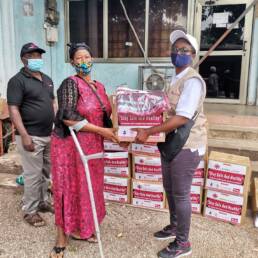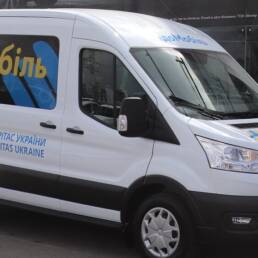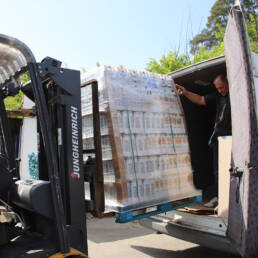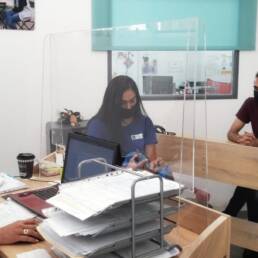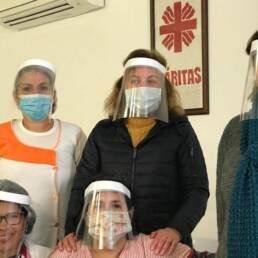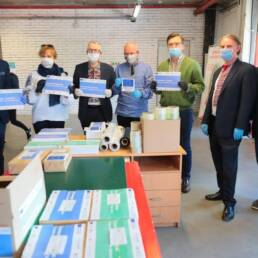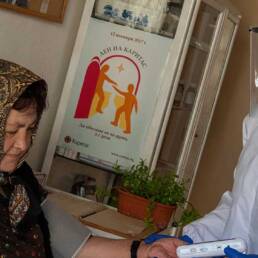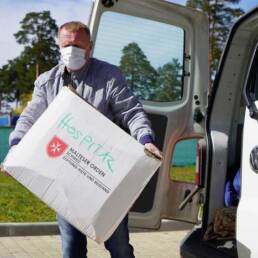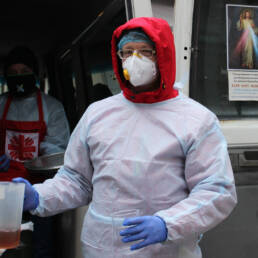Author
Thomas Hackl
Humanitarian Aid Programme Director
Caritas Romania
Doinita, a 42-year old mother of six children, lives in the Roma settlement called Craica at the outskirts of Baia Mare, a city in north-western Romania. The family stays in a small makeshift barrack made from wood and other scrap materials. When Caritas social worker Simona Muscan called her, Doinita was so happy to finally have somebody to talk to:
We cannot go out any more to do our day work. It is very difficult for us to get along with this situation. Only my oldest daughter still has a job, but I am afraid that the company where she works will close soon. We are all hungry. The children ask me for food all the time, but I can give them only what we have.
Families living in the Craica settlement are severely affected by the Coronavirus crisis, and it is not their health that they are most concerned of, but the extreme poverty that awaits them. During the last years, things slowly started to change for the better in the Craica community, where several hundred people have built their small huts along an abandoned railway line. Supported by a Caritas community centre, children started to attend kindergarten and school and more and more parents succeeded to find a regular job. But life was still difficult in Craica. Many families earned their livelihoods from occasional jobs, collecting scrap metals or even begging.
Now everything has changed. When the schools closed, the Caritas community centre run by the Diocesan Caritas of Satu Mare also had to close. Five of Doinita’s children attended the centre, where they got a daily meal. So, they did not only lose the place where they could learn and spend their time, but also the place where they could eat every day.
Caritas Satu Mare started to assess the situation of the beneficiaries of their community centres and other closed Caritas institutions by phone interviews. While the process is still ongoing, first results are already visible: In the Craica settlement, in March 2019, three out of four families had an income from occasional work. Now, in March 2020, this figure is only one out of three – and things will get even worse. With new lockdown regulations, the possibility of earning an income will disappear almost completely.
After talking with many families over the phone, I can confirm that for most of these people this period is very, very difficult, I very much want to be able to help these people, but because of the restrictive measures by the authorities, we need to think about how can we really help them.
Simona Muscan, who did phone interviews with almost 40 families from the Craica community
Diocesan Caritas organisations all over Romania try to find resources to support those most in need, but also to survive as organisations. Many social centres and programmes had to be closed, and since most of the services cannot be offered anymore, the state is not paying subsidies either. But the organisations try hard to keep at least their homecare services for the elderly and their residential institutions, like homes for the elderly, working.

A block of flats in the Soarelui neighbourhood in Satu Mare is another location where people are in a desperate situation. The block was originally built for unmarried workers of an industrial plant with tiny one-room apartments. Today, families with up to twelve members share this one room. Moni Lakatos and her husband with their ten children is one of them. Her husband is unemployed. She used to earn some money by selling socks on street-corners or at the local market. Now, the child allowance paid by state is the family’s only source of income:
I cannot go out anymore to earn some money. Police does not allow us to leave the building, except maybe to do some urgent shopping. Sometimes they even come into the block and send everybody into their apartments.
Six of Moni’s children attended programmes at Caritas social centres, where they received support for doing their homework as well as a daily meal. Now, Moni does not know how to procure the most basic things for her family: food, hygienic items or diapers for the smallest child.
When a social worker of Caritas called her, she proved to be well informed about Covid-19. She could name the main protection measures that should be taken and she was fully aware of the danger. But things are not that easy in her case, nor is it for many of the other families living in this block of flats. How to respect rules of social distancing when 12 people are sharing a small room and there are hundreds of people living in that same building? And how to respect basic rules of hygiene if even buying a bar of soap is a financial burden for the family?
In Romania, the public attention is on the growing number of people infected by Covid-19 and the health system that is already struggling to cope with the situation. The government also works on economic measures to support companies and the thousands of people who are at risk of losing their jobs. But there is another huge group of people who will be on the losing side of this crises: the poorest, most vulnerable and most excluded families and communities. There are not many who, at least, listen to the voices of these people. Caritas Romania and its diocesan member organisations will do their best to not leave them alone.


